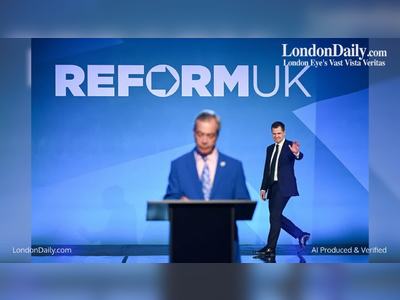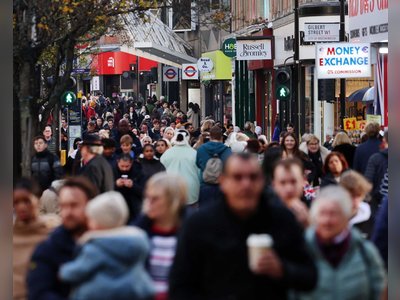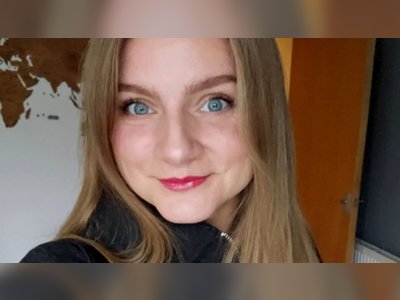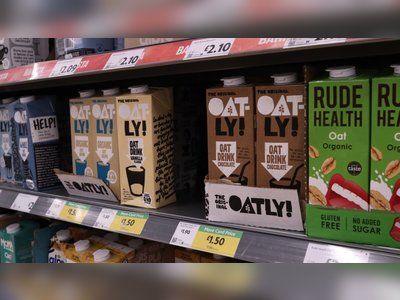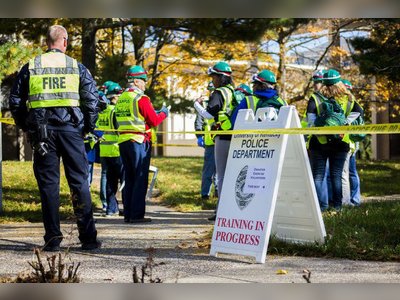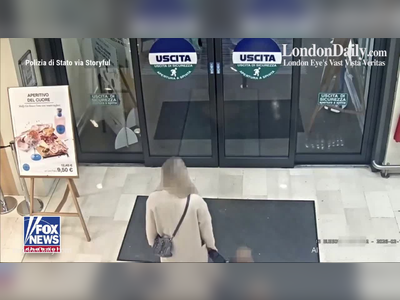Alfie Allen: ‘The only competition on Game Of Thrones was over who had the best six-pack’
When Alfie Allen was nominated for an Emmy earlier this year, for his performance in Game Of Thrones, many were quick to point out that the boy from the 2007 Lily Allen single Alfie had finally proved his big sister wrong. In the song, Lily pleads with her weed-smoking little brother to get off his “lazy arse” and stop wasting his life away. After eight seasons of HBO’s epic fantasy drama, Allen, 33, appeared to have done just that. But the truth is more complicated.
“When Lily wrote the song, I was in Canada teaching kids how to snowboard,” he recalls, lighting a cigarette and taking a drag. He’d already moved on, and got his life together. “I was getting a snowboarding qualification. I went on Myspace [the social network where Lily first uploaded her music in 2005] and listened to it, and I was… entertained. It’s a song about love, isn’t it? She was missing her little bro!”
It didn’t bother him that people might have him pegged as a waster? “She was on the rise. She was killing it. I was like: as long as it helps your creative juices flow, then go for it. I just remember asking for it not to be a single – but then obviously record labels don’t give a shit what family members think, do they? So that was that.” Alfie, released as a double A-side with Shame For You, peaked at No 15 in the UK charts.
If the gamechanging Emmy nomination for his role as Theon Greyjoy hasn’t drawn a line under the song, then this next chapter certainly will. Prior to Game Of Thrones, Allen’s most high-profile work was fleeting roles in films such as Atonement (2007) and The Other Boleyn Girl (2008). Next month, he’ll star alongside Scarlett Johansson in the black comedy Jojo Rabbit, which won the top prize at the Toronto film festival. In spring, he’ll play the love interest in the highly anticipated big-screen adaptation of Caitlin Moran’s semi-autobiographical coming-of-age novel How To Build A Girl; he’ll also appear in the forthcoming true crime mini-series White House Farm, with Stephen Graham.
It’s a sunny autumnal day when I meet Allen, who is casually dressed in a Hard Rock Cafe T-shirt, black cap and shorts, by the pool at his secluded hotel‑style apartment building in a bohemian part of Los Angeles. It’s a temporary living arrangement that could turn into something more permanent: he has a one-year-old daughter, Arrow, with his former partner, Allie Teilz, a DJ who is based here.
I imagine he is enjoying a more settled lifestyle after being contracted to a juggernaut such as Game Of Thrones for almost a decade. Is it like being released back into civilisation: no more schedules, night shoots or relentless promo tours?
“I was excited to move on, without a doubt,” Allen says. “I think there was always that fear from when we started: God, you know, this is going to be for quite a while. You don’t want to get sucked into thinking negatively about something that’s essentially a very positive thing, but I would fluctuate. The majority of the time, the feeling for me was: I either give it my all, or I piss and moan about it. Even if you are going to piss and moan about something, you’re going to use that emotion to the betterment of your character, and that’s what I tried to do.”
A record 10 cast members were nominated for an Emmy this year, including Emilia Clarke and Kit Harington; was there competition between them when the cameras stopped rolling?
“At the beginning, me, Kit Harington and Richard Madden were definitely in some sort of competition about who could be in the best shape. It’s not like we were comparing, but there was definitely a macho vibe going around,” he cackles. “But I wouldn’t say there was competition in any sense other than who had the best six-pack. And Kit will always win that.”
The way Game Of Thrones ended came in for a lot of criticism, with members of the crew trolled online, and a petition demanding a reshoot of season eight “with competent writers”. Its critics felt it was rushed, with no room for character development. Why does Allen think fans reacted in that way? “People were just massively emotionally invested in it, and that’s testament to how great the show is. Things ended in a similar fashion with Breaking Bad and The Sopranos. There’s never a good ending and I think [the show’s writers] David Benioff and DB Weiss had a huge amount of pressure on them.”
Allen admits his judgment of the finale may be impaired by the fact that he was so satisfied with his own character’s heroic demise in episode three. He says it allowed him to move on from the show in a positive way; particularly as his character was so polarising and damaged; Theon orchestrated and endured violence so brutal that he was, in one season, captured, castrated and treated like a pet, mockingly named Reek. “It felt very isolating,” Allen says of the role. “The character was ridiculed at times.”
Meanwhile Theon’s identity crisis – raised alongside the Stark children but constantly reminded he wasn’t one of them – has made Allen think more deeply about men’s mental health in general. “I think it’s important that we talk about our problems without wearing that as some kind of badge of identity. Look at who is in power [in the US]. A lot of the bad decisions are down to toxic masculinity. If we can eradicate that, it’s going to be totally beneficial for future generations, and for any kind of kid growing up.”
Jojo Rabbit, which has Golden Globe nominations and has been tipped for Oscars, couldn’t have come along at a better time. Allen auditioned fresh from a post-Game Of Thrones holiday, looking for something new. Directed by the New Zealand director Taika Waititi (What We Do In The Shadows), the film is certainly unconventional. Set in Nazi Germany, it follows a single mother (Johansson) raising a 10-year-old son who is desperate to join the Hitler Youth and has an imaginary friend, a goofball version of Hitler, played by Waititi himself. Allen plays Finkel, the second-in-command to Captain Klenzendorf (Sam Rockwell) who runs the youth camp. It’s deeply moving at times, but its comedic treatment of the subject matter has polarised critics.
“Everyone is entitled to feel any way about any piece of art, but I would say satire is a tool that can be used to shine a spotlight,” Allen says. “One of the reasons Taika made the movie was because 66% of US millennials don’t know what Auschwitz is. That’s an insane statistic. And with the rise of rightwing politics and fascism, it seems the right time. If you feel it’s a movie where the subject matter is a bit too sensitive to even make a satire out of, I think you should watch it and see how it makes you feel.”
Before Jojo Rabbit, Allen had had little opportunity to showcase his comic timing, or to improvise on set. “Taika wants things to happen spontaneously,” he says. “Dave and Dan [the GoT writers] are very precious about their words, and rightfully so. I think one of the only improvs that was allowed was ‘aye’. Liam Cunningham and Kit Harington started saying ‘aye’, so Dave and Dan would allow the odd ‘aye’.”
After Jojo Rabbit, Allen is even more enthused about How To Build A Girl. Starring Lady Bird and Booksmart star Beanie Feldstein as the protagonist Johanna, it’s a film Allen is “really, really proud of and definitely one I would want my teenage daughter to be watching”. He plays the object of Johanna’s affections, a Welsh rock star called John Kite, and even got to record a song with Elbow’s Guy Garvey, which he performs in the film. I tell him I didn’t know he could sing. “Well, I think it’s still up for debate,” Allen laughs. “Performing that song on stage at Camden Palace [the London venue now known as Koko] was the first thing I had to do on my first day on set, which was mad. I went to drum’n’bass raves there when I was a kid.”
How To Build A Girl is a family affair for Allen. Lily has a small cameo and their mother, Alison Owen, produced it. Allen laughs awkwardly when I mention this. Did his path cross with his mother’s when he was filming? “She was there. Mum is very committed, very professional. She’s not one of those in-and-outs,” he says jovially, suddenly sounding very cockney.
Did he have to answer to her? “No, not at all. She’s kind of my boss in a weird way but… Caitlin was the one who was pushing [for Allen to take the role] and obviously my mum was open to the idea.” He changes the subject. “Then Caitlin asked me to put on two stone. She put it on Twitter: ‘Alfie Allen, you need to go and eat some crisps and chips now, quickly.’ In the book, he’s a larger man.” Eventually, he says, the idea of bulking up was abandoned, but “I would have been totally open to it”.
With Owen and actor Keith Allen for parents, Allen and his older sister had a childhood that exposed them to parental narcissism, drugs and often neglect, according to Lily’s 2018 memoir My Thoughts Exactly, but Allen is reluctant to talk about it. Did he read the book? “I did. I thought it was brilliant. It’s really important that everybody is allowed to have their own truth. Lily’s book was beautifully written. I was scared about reading it, but then I found it to be really beneficial.”
What was he scared of? Allen hesitates. What he might find out? “No, no, no – just that [her book] would be better than mine. I’m joking.”
Are he and Lily close these days? He nods.
I ask what his upbringing taught him about being a parent. “Oh God,” he replies. Another pause. “I don’t know. Just that you have to just, you know – know that we all are in it together. We are all going to go through these similar journeys together, so let’s be nice.” What’s he like as a dad? “I’m very lovey-dovey. I like to put her on my chest. She’s the cutest little thing and I can’t wait till I get to see her.”
Advertisement
When Allen was in his 20s, and better known as the boy in the Lily Allen song than for anything else, he was portrayed in the tabloids as a bit of a party animal, hanging out at music festivals and rolling out of clubs. Dating Ray Winstone’s daughter Jaime – a fixture on the London social circuit – on and off for seven years probably didn’t help. The pair even appeared on a night out in a Madness music video in 2009. Do people’s misconceptions bother him?
“Yes and no. I don’t want to not care what people think, but at the same time I don’t feel I’ve done anything wrong,” he says. “I’m not really on the scene [like] I used to be.” Life today is quieter, and that suits him fine. “I like to go out and have fun sometimes, but I’ve always been a bit of a homebody,” he says. The winter sports have been replaced by hiking, but Allen still thinks of himself as sporty. “In LA you have to find your people according to the kind of life you want to live,” he says. I ask if he is ambitious, and he admits he is, but adds: “I don’t see my career as a trajectory, because I don’t feel like that’s going to bring me happiness.”
Walking me out, he says there is something exciting on the cards in the new year, but that he’s still grappling with how he feels about it. “It’s really dark and controversial,” he says, “but there’s a certain amount of humanity they want me to bring to it…” I say it sounds like an ideal next move, but Allen is still thinking about my last question.
“I think I am ambitious, but I don’t want to lose sight of my own emotional integrity and happiness. You have to be able to preserve that.”




